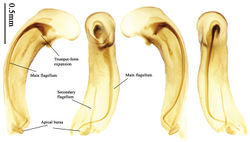Dasiosoma maindroni
| Notice: | This page is derived from the original publication listed below, whose author(s) should always be credited. Further contributors may edit and improve the content of this page and, consequently, need to be credited as well (see page history). Any assessment of factual correctness requires a careful review of the original article as well as of subsequent contributions.
If you are uncertain whether your planned contribution is correct or not, we suggest that you use the associated discussion page instead of editing the page directly. This page should be cited as follows (rationale):
Citation formats to copy and paste
BibTeX: @article{Shi2013ZooKeys284, RIS/ Endnote: TY - JOUR Wikipedia/ Citizendium: <ref name="Shi2013ZooKeys284">{{Citation See also the citation download page at the journal. |
Ordo: Coleoptera
Familia: Carabidae
Genus: Dasiosoma
Name
Dasiosoma maindroni (Tian & Deuve, 2001) comb. n. – Wikispecies link – Pensoft Profile
- Dasiosoma maindroni Tian & Deuve 2001: 126, Figs 4, 13. (original: Lachnoderma; type locality: Tonkin; holotype deposited in MNHN).
Type examined
Holotype of Lachnoderma maindroni Tian & Deuve, by original designation (MNHN): male, board mounted, “TYPE” [red label]; “TONKIN / Cap. Fouquet”; “MUSEUM PARIS / Ex Coll. M. MAINDRON / Coll. G. BABAULT 1930”; “Lachnoderma/ bicolor/ m.”; “Lachnoderma/ maindroni”. Paratype of Lachnoderma maindroni Tian & Deuve: 1 male (SCAU), “PARATYPE”[red label]; “TONKIN / Cap. Fouquet”; “MUSEUM PARIS / Ex Coll. M. MAINDRON / Coll. G. BABAULT 1930”, “Lachnoderma / maindroni / Tian et Deuve“[Fig. 58].
Non-type material examined
(Total 4 specimens). 1 male (IZAS), “Tonkin III / Hoa-Binh 1937/ leg. A. De Cooman” [pale red label][Fig. 89]. 1 female (IZAS), “VII Tonkin 39/ Hoa-Binh / leg. A. De Cooman” [pale red label][Figs 122, 136]. 2 females (MNHN), “Hoah binh/ Tonkin”; “Museum Paris/ 1988/ Coll. J. Negre”.
Diagnosis
Head and pronotum reddish yellow; elytra uniform dark brown; pronotal lateral margins completely rounded in middle; basal foveae of pronotum distinctly curved anteromedially, disc without elongate depressions; vertex strongly tumid; tempora abruptly narrowed behind eyes; body not distinctly slender, ratio EL/EW 1.35–1.40; aedeagus with median lobe strongly expanded at base, apical lamella narrow. The unique color, strongly tumid vertex, and tempora abruptly narrowed behind eyes readily distinguished this species from all others of the genus.
Description
Male genitalia with median lobe of aedeagus strongly bent, ventral and dorsal margins nearly straight before apex in lateral view; strongly bent to right side in dorsal view; apical lamella narrow, triangular, slightly longer than basal width; base of median lobe strongly bent and expanded, basal orifice about 90° relative to preapical shaft. Internal sac with main flagellum long and slender, slightly sinuous, curved to right side; trumpet-form expansion very small and short, strongly bent ventrally; secondary flagellum and apical bursa present; membrane adjacent to trumpet-form expansion finely scaled (Fig. 89). Female genitalia. Spermatheca simple, moderately long; spermathecal gland inserted at apical two-fifths of spermatheca, not branched, slightly longer than spermatheca; spermatheca slightly expanded and with ring-sculpture at apical one-fourth, basal part of spermatheca without sculpture (Fig. 136). Apical segment of ovipositor scimitar-form, inner margin gradually curved; length four times basal width; inner margin setose in apical half, outer margin setose in apical two-thirds; apex slightly sharp, with membranous extension slightly widened (Fig. 122).
Detailed description of external characters has been provided by Tian and Deuve (2001)[1].
Distribution (Map 7). All specimen of this species were collected from Tonkin (North Vietnam).
Remarks
This species was originally combined with genus Lachnoderma, but it is closer to Dasiosoma than Lachnoderma in having: (1) labrum and outer scrobe of mandibles nearly glabrous; (2) mentum tooth simple;(3) pronotal basal foveae deep and groove-like; (4) main flagellum of male genitalia not pointed from apical orifice. So we combine this species with Dasiosoma Britton herein.
Taxon Treatment
- Shi, H; Zhou, H; Liang, H; 2013: Taxonomic synopsis of the subtribe Physoderina (Coleoptera, Carabidae, Lebiini), with species revisions of eight genera ZooKeys, 284: 1-129. doi
Other References
- ↑ Tian M, Deuve T (2001) Notes on the genus Lachnoderma Macleay, 1873, with descriptions of six new species from China and Vietnam (Coleoptera, Carabidae). Nouvelle Revue d’Entomologie 18 (2): 123-133.
Images
|
![Figures 55–60. Type materials, scale bars = 2.0 mm: 55 Holotype of Dasiosoma sudanicum Basilewsky 56 Holotype of Dasiosoma ivorense Basilewsky 57 Holotype of Diamella indica Kirschenhofer [= Dasiosoma indicum (Kirschenhofer)] 58 Paratype of Lachnoderma maindroni Tian & Deuve [= Dasiosoma maindroni (Tian & Deuve)] 59 Lectotype of Singlis hirsutus Bates [= Dasiosoma hirsutum (Bates)] 60 The “lectotype” designated by Tian & Deuve, 2001 for Singlis hirsutus Bates.](https://species-id.net/o/thumb.php?f=ZooKeys-284-001-g010.jpg&width=250)



